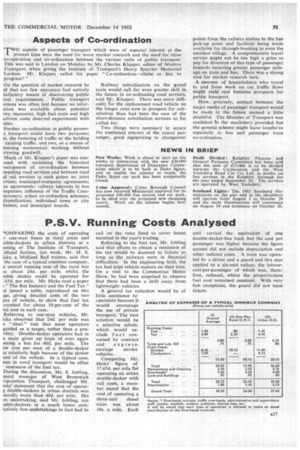Aspects of Co-ordination
Page 53

If you've noticed an error in this article please click here to report it so we can fix it.
TWO aspects of passenger transport which were of especial interest at the present time were the need for more market research and the need for close co-operation and co-ordination between the various units of public transport. This was said in London on Monday by Mr. Charles Klapper, editor of Modern Transport, when giving the Institute of Transport's Henry Spurrier Memorial Lecture. Mr. Klapper called his paper "Co-ordination-cliche or key to progress?"
On the question of market research he id that too few operators had entirely tisfactory means of discovering public wet requirements. Public transport isiness was often lost because no inforation was available about potential nars; moreover, high fuel costs and high atform costs deterred experiments with utes.
Further co-ordination in public passenr transport could have two purposes; le, the fostering of traffic or the holding ' existing traffic; and two, as a means of 'Mining economical working without viewing goodwill.
Much of Mr. Klapper's paper was conrued with reviewing the historical ;velopment of co-ordination between ■ mpeting road services and between road id rail services in such guises as: joint rvices; municipal-company agreements; ea agreements; railway interests in bus impanies; influence of the Traffic Cornissioners; urban co-ordination schemes; ttionalization; individual town or city hernes; and municipal boards. Railway subsidization on the grand scale would call for even greater skill in the future in co-ordinating road services, said Mr. Klapper. There was more difficulty for the replacement road vehicle on the longer runs now in prospect for substitution than had been the case of the short-distance substitution services so far called for.
Two things were necessary to secure the continued interest of the casual passenger, good signposting to changeover points from the•railway station to the bus pick-up point and facilities being made available for through-booking to even the smallest village. A comprehensive travel service might not be too high a price to pay for direction of this type of passenger towards incurring greater passenger mileage on train and bus. There was a strong case for market research here.
A canvass of householders who travel to and from work on car traffic flows might yield real business prospects for public transport.
How, precisely, contact between the major media of passenger transport would be made in the future seemed a little doubtful. The Minister of Transport was confident Trt the machinery provided but the general scheme might leave loopho'es especially in bus and passenger train co-ordination.




















































































































